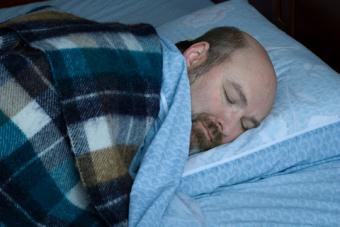
Much information about Parkinson's disease and insomnia is available, but few resources offer information about what to do to improve sleep for patients with the movement disorder. Roberta Greenberg, RN offers helpful information about Parkinson's disease, sleep problems and treatment strategies.
About Roberta Greenberg, RN
LoveToKnow (LTK): Please tell us about yourself.
Roberta Greenberg (RG): My name is Roberta Greenberg. I work as the RN Manager for Movement Disorders at Providence Saint Joseph Medical Center in Burbank, California.
I live in Simi Valley, CA with my husband, Steve, two extremely entertaining dachshunds, and a cranky old cat.
I love working with the movement disorders patient population. To be able to help restore function and mobility, to someone who thought it was lost to them forever, is an incredible gift. I am an educator, navigator, technical resource and advocate.
LTK: What inspired you to specialize in movement disorders?
RG: I am inspired by my patients every day. They live with such difficult challenges, but never passively. They get up each day and fight and they never give up hope. They are reading, researching, going and doing. They are looking for information like this article to ask "what can I do to improve my situation."
Parkinson's Disease and Insomnia
LTK: What factors contribute to insomnia in patients with Parkinson's disease?
RG: We're all familiar with the motor symptoms of Parkinson's Disease....the tremors, slow shuffling walking, masked face and hunched posture, but the non-motor symptoms are equally problematic for the patients. These include low, or fluctuating blood pressure, problems with bowel elimination, sexual dysfunction, excessive urination, and disruption of the sleep/wake cycle. Many Parkinson's patients only sleep for a few hours at night, and then struggle with sleepiness all day.
LTK: Is there a connection between rapid eye movement disorder and Parkinson's disease?
RG: Certainly, they are intimately connected. People experiencing rapid eye disorder will often have vivid, frightening dreams or hallucinations, or even night terrors, which can be very distressing to the patient. These kinds of episodes should be reported to the patient's neurologists. Treatment is essentially the same as for PD (Parkinson's Disease), but a mild mood stabilizer may be added for additional relief.
Treatments for Parkinson's Disease Insomnia
LTK: Are there treatments for insomnia for patients with movement disorders?
RG: There are several options to deal with the sleep/wake disruption common in PD. Many patients use a medication called Provigil (generic, Modafinil). This medication was originally developed for narcolepsy, but has been found to be very useful in Parkinson's sleep disruption. It makes the patient more alert during waking hours, and helps get the cycle back on track. The patient's neurologist can prescribe Provigil. Also, a mild sleep medication like Trazadone or Ambien can help patients sleep through the night, or at least a few more hours of the night.
LTK: Can daily routines improve the quality of sleep for people with Parkinson's disease and insomnia?
GR: People (and not just people with PD) should give themselves permission to take naps! Naps are healthy. Our bodies respond very well when we allow ourselves time to shut down and "recharge" for an hour. It's unfortunate that our culture has come to associate napping with "laziness" or lack of productivity. We would all make fewer mistakes and better decisions if we allowed ourselves a time-out to reenergize. Believe it or not, a short nap during the day (no more than an hour) will help you achieve a more restful sleep at night.
One of the reasons people with PD wake up at night is because they're trying to move and they can't. During normal sleep, we move our arms and legs, turn over, adjust the blankets, etc....all without waking up. It's our bodies way of keeping the blood circulating. When these movements can't be initiated because of PD, it wakes the person up. Some people find that taking a levadopa/carbidopa controlled release pill just before sleep helps with this problem.
And, of course, there are the common sense strategies like: no caffeine, alcohol, or big meals late in the evening.
LTK: When should patients see a sleep specialist about insomnia?
RG: Most of the time the patient's neurologist is able to manage the sleep/wake disruption of Parkinson's Disease. However, there will be a certain amount of patients who have concomitant sleep apnea, or other sleep disorders unrelated to the PD, who should be referred to a sleep disorder center.
Special thanks to Roberta Greenberg, RN for sharing information about Parkinson's disease and insomnia. Learn more about Providence Saint Joseph Medical Center by visiting the hospital's website.







